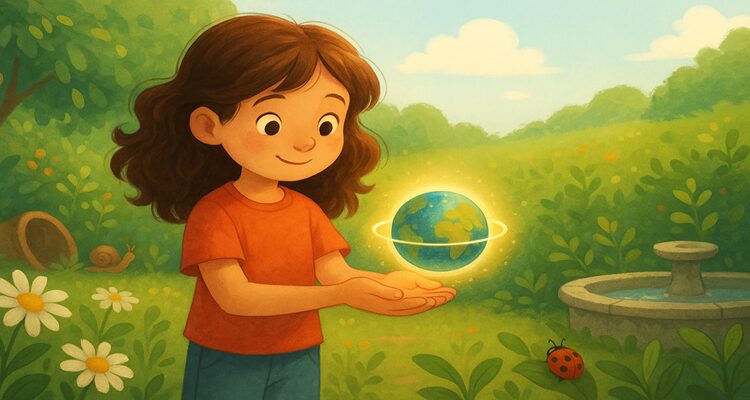Tara and the Pocket-Sized Planet

On a bright Saturday morning, Tara found a pebble that wasn’t a pebble at all.
She was exploring the edge of her grandmother’s garden, where daisies tickled her ankles and ladybugs liked to sunbathe on warm leaves. Tara loved to collect interesting stones, and today she spotted a smooth, round one tucked under a fern. It shimmered softly, the way puddles shimmer when the sun smiles. When she lifted it into her palm, the “stone” hummed a tiny, friendly hum, like a bumblebee telling a secret.
“Hello?” Tara whispered, just in case.
The pebble hummed again and flashed a tiny ring of light around its middle like a belt made of stars. Tara blinked. The “pebble” showed her a swirl of blue, green, and gold spinning inside it. She gasped. It wasn’t a stone. It was a planet. A teeny, pocket-sized planet.
Tara cupped it carefully. “You’re beautiful,” she said. “But how did you get so small?”
The planet answered with a puff of warm wind that smelled like cinnamon and pine. It tickled Tara’s nose, and she laughed.
Grandmother called from the porch, “Tara, lunch in twenty minutes!”
“Coming!” Tara answered, then looked back at her strange treasure. “We have a little time before soup,” she told the planet. “Would you like a tour of my garden?”
The planet hummed an eager yes. So Tara showed it the daisies, the marching ants, and the shy snail hiding under a cracked pot. Wherever she pointed, the tiny planet flickered with matching colors green when she showed it a leaf, golden when she showed it a sunflower, silvery when a cloud passed over. It was copying the world around it, like a mirror that painted with feelings.
When Tara reached the tiny fountain, the planet wobbled. The starry belt flickered fast. Tara’s fingers tingled.
“Are you okay?” she asked.
The planet opened, not like a door, but like a dream. A gentle glow wrapped around her, and suddenly Tara felt lighter light as a dandelion seed. The garden stretched away like a friendly giant. The fountain became a sparkling ring. And Tara realized, with a flutter of amazement, that she had stepped somehow, some way, onto the tiny planet itself.
She stood on a hill no bigger than a muffin, with a sky like a soft blue blanket pulled just above her head. Around her were minuscule mountains, a ribbon river, and forests of thumb-high trees with leaves shaped like musical notes. Nearby, a city of pebble-sized houses sat in a neat circle, each rooftop painted a different color of the rainbow. Little lights moved inside. Tara knelt, breathless.
A door the size of a postage stamp opened. Out stepped a being the size of a grain of rice, wearing a coat made of glittering threads and a hat shaped like a crescent moon. He bowed. “Welcome, Great Walker,” he called in a voice like a tiny bell. “I am Professor Pip.”
Tara smiled. “Hello! I’m Tara. I didn’t mean to be a Great Walker. I was just… walking.”
Professor Pip twinkled. “Our planet shrunk itself to stay safe while we fixed a problem. But we need help, and your footprints are gentle. Will you listen?”
“Of course,” Tara said, sitting carefully so her knees wouldn’t make an earthquake.
The professor waved his hat, and more tiny people appeared—gardeners with petal aprons, inventors with tool belts, children with kite strings that rose into the nearby clouds. They led Tara to the ribbon river. Up close, she saw it was blocked by a clump of sticky fluff. The fluff shook and grumbled.
“That’s the Grumple,” whispered a little gardener named Lila, whose hair looked like a daisy. “He lives in the river and hates noise. But our city needs the river to sing through the wheels that spin our light. Without the song, our houses go dark.”
The Grumple grumbled louder, splashing gloom into the water. Tara could feel it—like a frown hiding behind a curtain.
Professor Pip sighed. “We tried machines. We tried music that was very, very polite. Nothing worked. The planet shrunk to keep us safe while we figured it out. But time is short. Our light is fading.”
Tara touched the ground. She listened to the soft rustle of note-shaped leaves, the distant giggles of the tiny children, and the quiet grumble in the river. Then she remembered something Grandmother always said: “When someone is grumpy, try a little kindness first and a lot of listening.”
“May I talk to the Grumple?” Tara asked.
“He may be rude,” Lila warned.
“That’s okay,” Tara said. She leaned close to the river. “Hello, Grumple. I’m Tara. I don’t like loud noises either when I’m tired.”
The water bubbled, then settled. A face peeked out, mud-brown with eyes like polished stones and whiskers of river grass. “Everyone shouts,” the Grumple complained, voice like wet boots. “Everyone rushes. No one asks me what I need.”
Tara nodded. “What do you need?”
The Grumple blinked, surprised. “I need a quiet hour each day to rest my ears. And I need the river to flow smoothly, not stutter through gears that clunk and rattle. The clunking hurts my head. I tried to say so, but no one heard me. So I made a dam. I grumped. I grumbled. I grumbled.”
Professor Pip flushed. “We were busy keeping the lights on. We forgot to listen.”
Tara smiled gently. “Maybe there’s a way to keep the lights on and keep your quiet, too. Would you try again if we promise to change?”
The Grumple glanced at the city’s rainbow rooftops, dim and waiting. His whiskers drooped. “I would try.”
Tara turned to the inventors. “Could you build something that spins with the river but doesn’t clunk? Maybe a water wheel that hums like a lullaby?”
The inventors huddled, sketching on leaf paper. One whistled. Another snapped tiny gears together made of smooth shells and silky seeds. In moments, because tiny people can be very fast when they care they rolled out a new wheel, round and quiet. Lila dipped it into the river. The wheel spun, making a soft, soothing hum more like a cat purring than a machine.
The Grumple sighed with relief. “That doesn’t hurt.”
Professor Pip bowed. “We will also make a Quiet Hour sign at the city bridge, no music, no marching, only whispers while you rest.”
The Grumple took down his fluff-dam. Water rushed. The ribbon river sang, guiding the new wheel. Lights winked alive along the rainbow roofs. The note-leaf trees chimed gently, like tiny wind bells.
Tara clapped. Everyone cheered well, they cheered quietly, because the sign wasn’t up yet, but they cheered with their hands and their eyes and their bright little smiles.
“Thank you, Great Walker,” Professor Pip said, offering Tara a pin no bigger than a sprinkle. It was shaped like their starry-belted planet. “You listened. You helped. Our home can be normal-sized again.”
The ground hummed. The sky tugged. Tara felt the gentle glow return, wrapping her like warm sunlight. The tiny city waved, the Grumple flicked his whiskers in goodbye, and the world whooshed. Tara blinked back into her grandmother’s garden, still holding the pocket-sized planet in her palm.
Except it wasn’t so pocket-sized anymore.
The sphere in Tara’s hand grew like a bubble. In an instant, it rose above her head, then hovered lightly in the garden air, still small for a planet but much too big for a pocket. Tara laughed and stepped back as it floated beside the fountain, as easy as a balloon tied to the earth with an invisible string.
Grandmother called again, “Tara, lunch!”
Tara looked at the planet. “Will you be okay here while I eat soup?”
The planet answered with a soft, grateful hum. On its surface, Tara could just make out the ribbon river glittering and the little city shining with steady, quiet light.
During lunch, Tara told Grandmother the whole story. Grandmother listened with patient eyes and said, “Kindness is a key that opens the trickiest locks. You used it well.”
After soup, Tara returned to the garden with a tiny tune she made up, humming so softly it wouldn’t bother even the shyest creature. The planet drifted near like a new friend. Lila’s voice shimmered from within, teeny and clear: “Would you like to visit again tomorrow?”
Tara grinned. “I’d love to. But only after your Quiet Hour.”
Days passed, and Tara and the planet kept each other’s company. Sometimes Tara told stories to the note-leaf trees, and they rustled along. Sometimes she watched the inventors glide boats down the river, their wheels purring. Sometimes she and the Grumple took turns practicing “listening faces” that made even the bossiest worries sit down and behave.
As the seasons turned, the planet learned from the garden, and the garden learned from the planet. The fountain bubbled more cheerfully. The daisies danced just a little in time with the planet’s soft hum. Neighbors wondered why Tara’s garden felt so welcoming, as if the whole yard remembered your name.
One evening, as the first star peeped out, Professor Pip’s voice rang like a gentle bell. “Great Walker, we can fly on our own again. Our planet is steady. But may we stay nearby? We like your sky.”
Tara looked up at the tiny star that wasn’t a star at all. “Stay,” she said. “You are part of our family now.”
The planet tucked itself among the clouds. Some nights it drew a scarf of shimmering dust across the moon. Tara liked to think the scarf kept the sky from catching a cold.
Whenever the world felt too loud, Tara would stand by the fountain and close her eyes. She would listen truly listen to the hum of the planet, the whisper of the leaves, and the soft, steady heartbeat of everything living together. And she would remember that even small voices matter, especially when they teach us how to be kind.
(Moral: Listening with kindness helps everyone find a peaceful, happy way forward.)
Also Read: Google’s Gemini AI Now for Kids: What Parents Must Know










